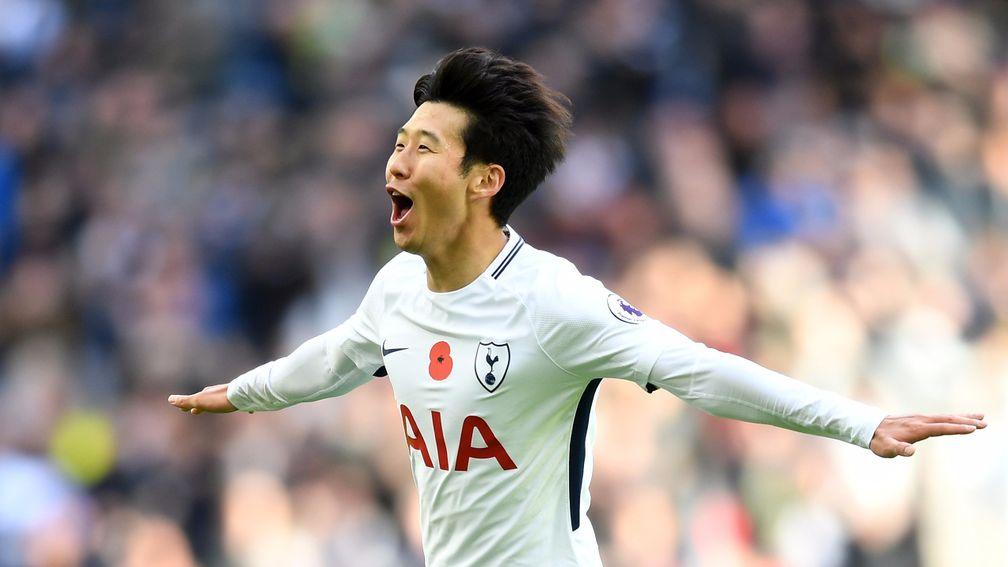- More
Teams happy to be more adventurous on home soil
Sides attack more on home patch

When will West Ham feel truly at home in the London Stadium? Will Tottenham ever feel they are anything other than lodgers at Wembley?
It will happen if they become convinced that they are more likely to win there than elsewhere. And if we think about why that is so we can work out what ground advantage is. The answer might surprise you.
Tottenham are playing home games at Wembley this season because White Hart Lane is being rebuilt. West Ham moved into the London Stadium last season after more than a century at Upton Park.
West Ham manager Slaven Bilic said the venue built for the 2012 Olympics was starting to feel like home earlier this season after a 2-0 win against Huddersfield. After losing 4-1 to Liverpool on Saturday he sounded like a man who thinks he is going to be evicted.
Tottenham manager Mauricio Pochettino said Wembley was beginning to feel like home last month after a 4-1 victory over Liverpool.
Overall teams win more often at home than away. Why? Let’s get to the bottom of this.
A player is more likely to score with a shot at home than away. It sounds incredible but it is true.
I looked at goals-to-shots ratios for periods of between ten and 20 seasons and found the same thing in the Premier League, La Liga, Bundesliga, Serie A and Ligue 1, as well as in the three divisions of the Football League. A home player was slightly more likely to score with a shot than an away player.
Why? It might be because shooters are sharper at home than away, but I think a more plausible explanation is that home teams shoot from better positions than away teams.
Teams win more often at home than away because they try harder to win at home than away. They play more adventurously at home, committing more players to attacks, which enables them to manoeuvre the ball into better shooting positions. And to do so more often.
We can see this clearly if we look at other stats.
For all practical purposes we can say that both teams in a match gain possession the same number of times. In matches where both teams have the same share of ball-in-play time home teams have more shots and score more goals than away teams.
Both teams gain possession the same number of times, both teams have the ball in total for the same length of time, but the home team are likely to have more shots and score more goals. How can this be?
The most plausible explanation, I believe, is that home teams spend more of their time with the ball close to the opposition goal. They could do this if they play more adventurously and send more players forward.
We see the same thing if we look at matches in which both teams complete the same number of passes. Both teams gain possession the same number of times, so each of those possessions contains on average the same number of passes. Yet home teams have more shots and score more goals.
How can this be? The most likely explanation, in my opinion, is that home teams make more passes further up the pitch. They could do this if they attack more forcefully, with stronger intent and greater numbers. In matches where each team is responsible for 50 per cent of all completed passes, home teams have 56 per cent of all shots and score 57 per cent of all goals. Those stats come from the last five seasons in the Premier League, La Liga, Bundesliga, Serie A and Ligue 1.
Ground advantage exists because teams try harder to win at home than away. To do this perhaps some teams need to be convinced that they can succeed more often at home – and perhaps in the meantime opponents become more doubtful than usual that they will fail away.
More from Kevin Pullein
Winning becomes more important with a big clash on the horizon
Normally teams play more adventurously at home and more cautiously away. And the consequences tell us something heartening about football. Attacking football is not only more entertaining to watch, it is also more effective.
There are times when defence is more advisable than attack. For example, when your opponents are better than you. Generally speaking, though, attacking football is more effective than defensive football.
We can see this if we look at Premier League games played in the last 20 seasons between teams who finished next to each other in the table. There were for all practical purposes no differences in ability.
On the day the only difference between teams was that one played more adventurously than usual and the other more cautiously than usual. And what a difference that made: home teams won 47 per cent of games, drew 27 per cent and lost only 26 per cent.
New surroundings can harm results

How well have other teams settled into new surroundings? Five summers ago my colleague Steve Davies wrote a great piece on new grounds in the Racing Post’s pre-season pullout The Big Kick-Off. I cribbed his research, which covered 2000 to 2012, and added other clubs who have moved since and some who had moved before.
I confined myself to Premier and Sky Bet Football League clubs. I then limited myself to teams who played their last season in the old stadium and their first season in the new stadium in the same division. Otherwise comparisons of before and after would have been misleading. I was left with 20 teams who changed stadium between 1993 and 2016.
And what did I find? At home in the league in their last season in the old ground teams averaged 1.6 goals for and 1.1 goals against. At home in the league in their first season in the new ground teams averaged 1.6 goals for and 1.1 goals against.
Results were different, however, and they are what matter. In their last season in the old stadium teams won 52 per cent of games, drew 25 per cent and lost 23 per cent. In their first season in the new stadium they won 47 per cent, drew 26 per cent and lost 27 per cent. In the last season in their old home they averaged 1.8 points per game. In the first season in their new home they averaged 1.7 points per game.
Perhaps the identical scoring stats are a fluke and the differences in results are meaningful. My opinion is that most likely the differences in results are random fluctuations.
Given the goals teams scored and conceded I would have expected them in both seasons to win about 50 per cent of their home games, draw 27 per cent and lose 23 per cent – in between what happened but not far away from it.
Today's top sports betting stories
Follow us on Twitter@racingpostsport
Like us on FacebookRacingPostSport
Published on inBruce Millington
Last updated
- Vaccine offers hope that sport will open its doors and is something to celebrate
- DeChambeau's approach doesn't appeal to me, but his price certainly does
- We'd do well to pay greater respect to life's uncertainties
- Bruce Millington: celebrate the range of racing options rather than cutting back
- Villa are clearly on the up but theirs odds oversell the chance of a title miracle
- Vaccine offers hope that sport will open its doors and is something to celebrate
- DeChambeau's approach doesn't appeal to me, but his price certainly does
- We'd do well to pay greater respect to life's uncertainties
- Bruce Millington: celebrate the range of racing options rather than cutting back
- Villa are clearly on the up but theirs odds oversell the chance of a title miracle